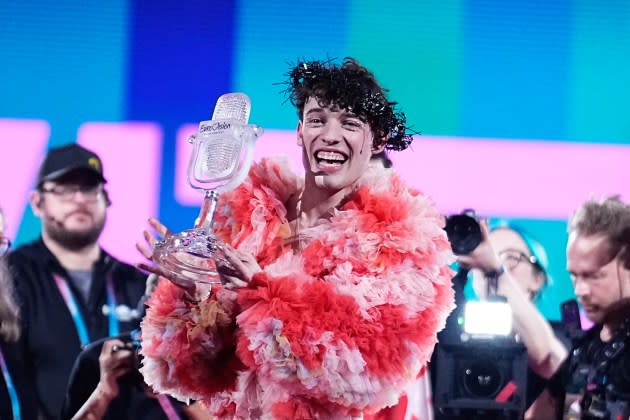Switzerland’s Nemo Wins 2024 Eurovision Song Contest
- Oops!Something went wrong.Please try again later.

The 2024 Eurovision Song Contest winner has been crowned. On Saturday, the annual music event came to a close with Switzerland’s Nemo taking the top prize for their performance of “The Code.”
Nemo bested Croatia’s Baby Lasagna, a favorite to win, with his song, “Rim Tim Tagi Dim” — he came in second place. Ukraine was third, followed by France and Israel.
More from Rolling Stone
Netherlands' Eurovision Contestant Disqualified From Finals After Incident With Crew Member
Eurovision Is Plunged Into Crisis as Deep Political Divisions Intensify
How to Watch 'Eurovision' 2024: Live Stream the Song Contest Online
The lead-up to the tense grand final included some controversy: Mere hours before the winner was to be crowned, Netherland’s Joost Klein was ousted after the singer had advanced from the semi-finals on Thursday following his performance of the song “Europapa.” However, he was not present during rehearsals on Friday.
On Saturday, Eurovision producers the European Broadcasting Union (EBU) confirmed that Klein had been disqualified from the competition after a female production crew member reported to Swedish police that Klein allegedly made “unlawful threats” following the semifinals at Malmö Arena.
The Eurovision finals were hosted in the coastal Swedish town Malmö, following the win of Sweden’s own Loreen in 2023. Ahead of the finale, the contest’s top contenders included Sweden’s Marcus & Martinus with “Unforgettable,” Ukraine’s Alyona Alyona & Jerry Heil with “Teresa & Maria,” Germany’s | ISAAK with “Always On The Run,” Luxembourg’s TALI with “Fighter,” and Netherlands’ Joost Klein with “Europapa.”
Israel’s Eden Golan was also vying to win leading up to the finale with “Hurricane.” The participation of Israel in this year’s Eurovision Song Contest became a tense minefield for both the event organizers and its participating contestants. In Friisgatan, an area deemed “Eurovision Street,” thousands of protesters filled the street waving Palestinian flags while demanding a ceasefire and an end to the Israeli government’s military occupation in Gaza.
Earlier this month, musician Olly Alexander — who represented England in this year’s contest — defended his decision not to boycott the event by creating distance between himself, the contest, and the overall conflict.
“Obviously, there are a lot of things I wish were different. And this is so much bigger than me and Eurovision, it really is,” he told The Times. “Obviously, I wish there wasn’t a war or this insane humanitarian crisis. I wish for peace and I have found this experience, at times, extremely… I’ve just felt really sad and distressed. But I still believe it’s a good thing when people come together for entertainment. That’s why I wanted to do Eurovision.”
Scott Bryan, who reports on Eurovision for British TV and radio, recently told Rolling Stone: “I would certainly say that Eurovision is in a bit of a crisis. Compared to where we were a year ago, it couldn’t feel any more different. It’s gone from being a really strong year in Liverpool, where it almost felt invincible, to a situation where there are very loud calls for boycotts.”
During Tuesday night’s semi-final, Sweden’s 2011 Eurovision winner, Eric Saade (who is half-Palestinian) performed in the halftime slot. He had a Palestinian keffiyeh wrapped around his wrist during the performance and had previously criticized the EBU’s decision to ban Palestinian flags from the arena during the contest. Flags of non-competing nations were also banned. “It is more crucial than ever for me to be present on THAT STAGE,” he wrote on Instagram ahead of the performance. “You may take our symbols, but you cannot take away my presence.”
Best of Rolling Stone
